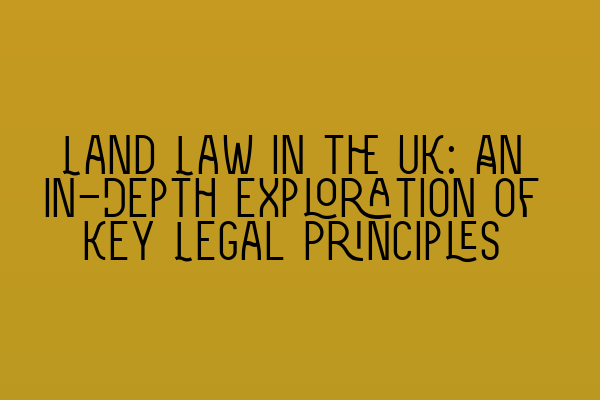Land Law in the UK: An In-Depth Exploration of Key Legal Principles
Welcome to SQE Property Law & Land Law, your trusted source for comprehensive information on land law in the UK. In this blog post, we will take you on an in-depth exploration of the key legal principles that govern land ownership, transactions, and disputes. Whether you are a property owner, a tenant, a real estate agent, or a law enthusiast, this article will provide you with valuable insights and practical knowledge.
Understanding Land Law
Land law encompasses a wide range of legal principles and regulations that govern the ownership, use, and transfer of land and property. It plays a crucial role in facilitating property transactions, ensuring legal rights and responsibilities, resolving disputes, and maintaining a fair and orderly society.
As the UK is a common law jurisdiction, property rights and land law principles are primarily derived from case law, statutes, and regulations. It is essential to have a solid understanding of the fundamentals to navigate the complexities of land law effectively.
Before we dive into the key principles, here are a few related articles that you may find helpful:
- Updates in UK Property Laws: Key Changes and Implications
- Legal challenges in property transactions: A comprehensive guide
- Navigating Lease Laws in the UK: Essential Guidelines for Tenants and Landlords
- Dominate Property Law Questions: Avoiding Common Pitfalls
- Land Law Revision Tips: Ace Your Exam Preparation
Key Principles of Land Law
1. Legal Title and Ownership: Understanding the concept of legal title is crucial in land law. Legal title refers to the registered ownership of land as reflected in the Land Registry. We will explore the registration process, confirming ownership, and the importance of conducting property searches.
2. Equitable Interests: In addition to legal title, equitable interests play a significant role in land law. Equitable interests are rights or claims that may exist alongside legal title, such as beneficial interests and restrictive covenants. We will delve into the different types of equitable interests and their implications.
3. Land Transactions and Leases: Buying, selling, or leasing land requires careful consideration of legal requirements and obligations. We will discuss the essentials of land transactions, including contracts, conveyancing, stamp duty, and lease agreements.
4. Easements: Easements grant certain rights over another person’s land without transferring ownership. We will examine the various types of easements, their creation, enforcement, and potential disputes that may arise.
5. Restrictive Covenants: Restrictive covenants impose limitations on the use of land and properties. We will explore their purpose, enforcement, modification, and the potential impact on property owners and developers.
6. Adverse Possession: Adverse possession allows individuals to acquire legal title to land they have occupied without the owner’s permission. We will discuss the requirements, limitations, and implications of adverse possession claims.
7. Landlord-Tenant Relationship: Land law governs the rights and obligations of both landlords and tenants. We will provide a comprehensive overview of tenancy agreements, rent reviews, repair obligations, and termination procedures.
8. Boundary disputes: Boundary disputes can be a common source of contention between neighboring landowners. We will examine how land law addresses such disputes, including boundary determinations, adverse possession claims, and rights of way.
9. Property Development: Property development involves navigating a complex web of legal requirements, planning regulations, and contractual obligations. We will explore the fundamental principles of property development and the associated legal considerations.
10. Land Registration: The Land Registry plays a vital role in recording and protecting property rights. We will discuss the importance of land registration, the process, priorities of interests, and rectification procedures.
Now that you have a broad understanding of the key principles of land law, we encourage you to explore the related articles mentioned above for further insights and guidance.
In Conclusion
Land law in the UK is a vast and intricate area of legal practice, encompassing numerous principles and regulations governing land ownership, transactions, and disputes. By familiarizing yourself with these key principles, you can navigate the complexities of land law with confidence and ensure your rights and interests are protected.
At SQE Property Law & Land Law, we are committed to providing reliable information and expert insights to equip you with the knowledge you need. If you have any specific questions or require professional legal assistance, please do not hesitate to contact us.
